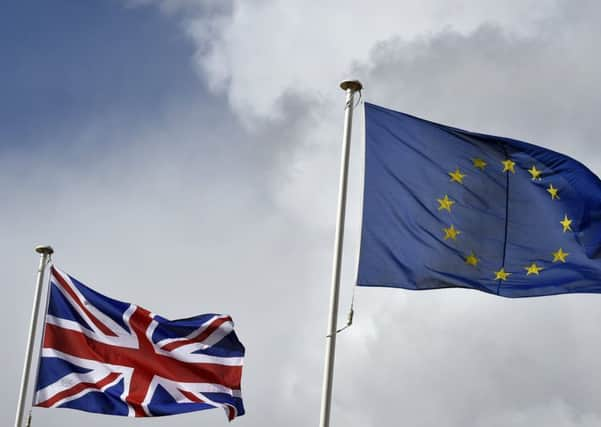Ted Bromund: Brexit was a reality check which Tories must now implement


And then there’s the bit about being interesting. Since 2010, Britain has had two general elections that produced unexpected results, and three referenda – on the alternative vote, Scottish independence, and Britain’s membership of the European Union.
For a nation where supposedly nothing much happens politically, it’s a remarkable record. And a substantive one: You would be hard pressed to find another nation in the world where the people have made so many serious decisions (and, to my mind, made them so well) so rapidly.
Advertisement
Hide AdAdvertisement
Hide AdBut as party conference season comes to a close with the Tories in Birmingham, what stands out is that this record of political achievement stands against a background of party political collapse, with three of the UK’s four parties apparently refusing to learn from defeat.
Ukip’s problem is that it was never entirely sure if it was a campaign or a party. It’s tried to be both, and managed to be neither: Crusaders aren’t interested in dull things like party organisation, and parties need more issues than crusaders can muster.
At least in theory, the Liberal Democrats have the opportunity to seize the centre that Tony Blair occupied in 1997: socially liberal and fiscally conservative. But at this point, unwillingness to accept Brexit is disqualifying: You cannot claim to be a democratic party and reject the results of the largest vote in British history. A crusade for the EU is the definition of quixotic.
And then there’s Labour. I am, obviously, a conservative, but what is happening to Labour is a genuine tragedy. It was once the party of great men like Clement Attlee and Ernest Bevin: I don’t share their socialism, but no one can deny their patriotism. For that legacy to culminate in a man like Jeremy Corbyn is crushingly anti-climactic.
Advertisement
Hide AdAdvertisement
Hide AdWilliam Hague’s witty recent column in the Telegraph on how Labour’s moderates should assassinate Corbyn – as he notes, he knows something about political assassinations – offers the hope that Corbyn might still be eased out. But frankly, I don’t see it, despite the recent manoeuvring to keep Corbyn from completely controlling Labour’s NEC.
In the days of Michael Foot, when Labour lost an election, it tried – eventually – to learn its lesson. So, for that matter, did the Tories. But New New Labour isn’t about learning: it apparently is willing to contemplate widespread de-selections, and court a massive defeat in 2020 (or earlier) for the sake of political purity. It embodies the left-wing fantasy of the long march.
In short, three of Britain’s political parties have more or less given up on politics as we understand the term. They are crusaders who would rather tilt at windmills than enter the field of combat. They prefer to lose in purity than to compromise and win.
It’s no bad thing to have strong convictions in politics: Attlee and Thatcher, the dominant figures in post-war British politics, are proof enough of that. But politics are about give and take, about winning what you can when you can, and about biding your time, something that both Attlee and Thatcher at their best fully understood.
Advertisement
Hide AdAdvertisement
Hide AdThis is about more than Britain. It’s too grand to say that politics is about finding truth, which is beyond our ken. But the political process – which isn’t quite the same as the party one, though parties are part of the process – is one of the few sustainable advantages the democratic world has over the dictators, provided that we keep faith in our own system.
The democratic political market generates answers that, though far from truth, are truer over time than the answers other systems generate, in much the same way that the free market’s answers are better than those of central planning, even if they’re also not purely true.
Crusaders aren’t interested in answers that aren’t perfect by their lights. What I object to isn’t so much the lights – it’s the quest for the perfect. It is depressing to see so many of Britain’s political parties succumbing to its lure.
But I don’t therefore subscribe to the common view that this means the next election is in the bag for the Tories. A majority of 12 is by no means a smashing one, and much of the Tory lead in many constituencies would disappear if the Liberal Democratic vote shifted to Labour. If so, a matter of a thousand votes, perfectly placed, would deprive the Conservatives of their majority.
Advertisement
Hide AdAdvertisement
Hide AdThe fact that we cannot see how this could happen today is not compelling evidence that it won’t. Few people foresaw the Tory victory in 2015 or Brexit in 2016. A discrediting Tory performance will produce opposition, from what party it will. And the fact that three of Britain’s major parties have given up on politics doesn’t mean politics will give up on them.
The safety of the Tories to date lies not in their record of achievement, which is real but not compelling. It rest in the incapacity of their opponents, and that is a narrow basis for safety. It will not be broadened in Birmingham, because party conferences are about party morale and fundraising, not about doing things.
But conferences nonetheless mark the political calendar. So when the Tories reconvene in Manchester in a year’s time, they had better have the business of governing – Brexit, above all – well in hand. If they don’t, the temptation to turn to one of the crusaders can only grow.
Ted R. Bromund is a senior research fellow in Anglo-American Relations, based at The Margaret Thatcher Center for Freedom at The Heritage Foundation in Washington.